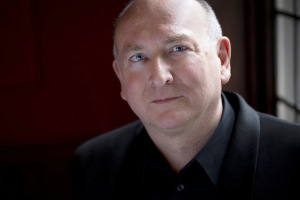
Last night I attended the reading by Martin Amis at this year’s edition of the Edinburgh International Book Festival. I haven’t had a chance yet to get to his latest novel, The Zone of Interest — from which Amis read an extended excerpt — but it sounds a good deal more substantial than Time’s Arrow from 1991, which also concerns the Holocaust.
Last night’s interview with Alan Taylor, editor of The Scottish Review of Books, included discussion of what drew Amis to such a bottomlessly grim subject, the virus of ideology vis-à-vis religion (and its contemporary manifestations, e.g., Isis), the insights of Primo Levi as a survivor, the writing process, the novelist’s famous “war against cliché” (with a brief excursion into Joyce, recapping some themes from his essays — such as a reading of Ulysses as essentially “about cliché”), and a brief tribute to Christopher Hitchens (by way of a joke that surely would have been more effective when stretched out in Hitchens’s characteristic manner).
There were some very thought-provoking reflections on the nature of evil, the terrible historical “fusion” that led to Hitler and the Nazis, and the impossibility of finding an “explanation.” Amis stated, “What I do reject is the claim that it’s easy to understand — that this kind of brutality and fanatical hatred is simply atavistic human nature at its root, waiting to come out.”
The subject was not one he “decided on,” Amis explained, referring instead to Nabokov’s notion of the “throb” — the moment of recognition an artist gets when it becomes clear that “here is something I can write a novel about.”
In his review, Taylor ventures that The Zone of Interest might be Amis’s “greatest book”:
What Amis has achieved through fiction is to illuminate that which history can only hint at. By and large, we do not know what those who prosecuted the genocide in the first half of the 1940s thought or felt. Their testimonies were compromised, their accounts self-serving, designed to save their skins or excuse the inexcusable. Like Doll, Rudolph Hoss, who was in command of Auschwitz for three years and who presided over the extermination of a quarter of a million people, was insensitive, apathetic and obsessed with notions duty and efficiency. Killing had no effect on him. Everything could be explained by quoting numbers. Amis puts us where we would rather not go, into the head of someone like him, someone emotionally dead, to whom life is actually meaningless.
Filed under: book recs, novelists, Uncategorized









